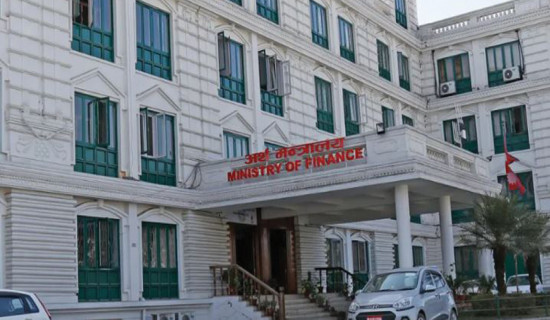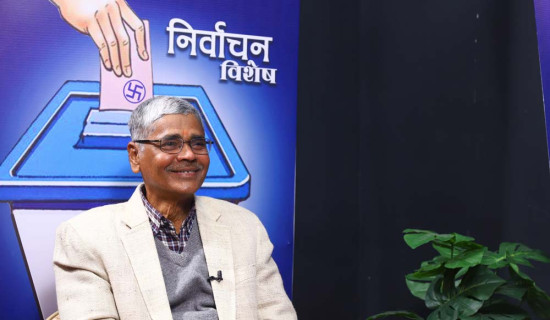- Tuesday, 3 February 2026
How Libraries Can Promote Literacy In Nepal
In Nepal, where literacy rates still lag behind the global average, public and community libraries are more than just repositories of books—they are powerful tools for promoting literacy and fostering a culture of reading. Libraries provide access to knowledge, encourage reading habits, and offer an inclusive environment where citizens of all ages can improve their literacy skills. Drawing parallels from similar efforts in India and leveraging insights from global best practices, Nepal can elevate its literacy programmes by strengthening its network of public and community libraries.
Public libraries, often viewed as community-centric institutions, play an essential role in fostering literacy by offering a wide range of reading materials, educational programmes, and resources for both children and adults. In rural and underserved areas, where access to education may be limited, libraries can serve as alternative learning spaces. This is especially critical for Nepal, where a significant portion of the population lives in remote areas with limited educational infrastructure.
Outreach programmes
Libraries can promote literacy by offering community outreach programmes that target both young learners and adults who may have missed out on formal education. In India, for example, public libraries have been pivotal in promoting literacy among underprivileged groups through community outreach initiatives. These libraries create a culture of reading by organising book drives, reading programmes, and even mobile library services, making literacy resources accessible to all.
One of the most significant contributions of public libraries is in early childhood literacy. Libraries can collaborate with schools and parents to develop programmes that encourage early reading habits in children. Research shows that libraries can significantly impact a child’s cognitive development by providing a rich selection of books, interactive learning materials, and storytelling sessions. Libraries in Nepal can adopt these models to ensure that children, especially in rural areas, develop literacy skills from a young age.
In addition, library-based early literacy programmes have been highlighted as best practices in several countries. Thy help introduce children to reading in a playful, engaging environment, fostering a love for books from an early age. By implementing similar programmes, Nepali libraries can play a crucial role in developing early literacy skills among young learners.
Public libraries are also key players in adult literacy programmes. In many cases, adults in rural Nepal may not have had the opportunity to complete their formal education. Libraries can offer adult literacy classes, basic education programmes, and access to learning materials that cater to adult learners. This not only improves their reading and writing skills but also empowers them to participate more fully in social, political, and economic activities. A UNESCO report points out that libraries have proven effective in supporting national literacy efforts by offering informal learning environments that encourage lifelong education. Libraries in Nepal can become instrumental in this regard by offering literacy programmes that cater to adults, especially those from marginalised communities.
In the digital age, literacy extends beyond the ability to read and write. Digital literacy, or the ability to navigate and use information and communication technologies (ICT), is increasingly essential. Public libraries can bridge the digital divide by offering access to computers, the internet, and digital literacy programmes. This enables individuals to access a wealth of information online, improving their education and employability. Nepal's libraries, like those in India, need to adopt a forward-thinking approach to foster digital literacy. For instance, a national library policy, similar to what is being proposed in India, could formalise efforts to make libraries the go-to centres for both traditional and digital literacy.
National policy
The development of a national policy for public libraries in Nepal could further enhance their role in promoting literacy. A coherent policy framework would provide direction for the development of libraries, ensuring that they are equipped with the necessary resources, staff, and infrastructure to meet the literacy needs of the population. Moreover, collaboration between the government, non-governmental organisations, and international agencies can ensure sustained funding and support for literacy programmes across the country.
Drawing from guidelines provided by the International Federation of Library Associations (IFLA), libraries can develop comprehensive literacy programmes that address the needs of different community groups, from young children to adults and the elderly. Such a policy would ensure that libraries are not just seen as book-lending institutions but as active participants in the national literacy drive.
Public and community libraries in Nepal hold the potential to significantly improve literacy rates and foster a reading culture across the country. By drawing inspiration from global practices and tailoring these to meet local needs, libraries can become central to literacy promotion efforts. Developing early literacy, supporting adult learners, and bridging the digital divide through public libraries can have long-term impacts on Nepal’s literacy landscape. A national library policy that aligns with these goals could ensure that libraries play an even more prominent role in Nepal’s development, making literacy accessible to all.
(The author is President of Nepal Library Association.)
















